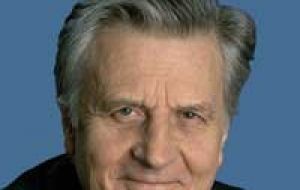MercoPress. South Atlantic News Agency
Global economy close to “inflection point” says leading central bankers
 European Central Bank President Jean Claude Trichet
European Central Bank President Jean Claude Trichet The global economy has stopped its steep slide and is on the verge of making the long, slow climb back toward stability, said European Central Bank President Jean Claude Trichet who chaired on Monday a meeting of the world's leading central bankers.
As far as growth is concerned, we’re around the inflection point in the cycle, that’s the sentiment” Trichet said at a press conference at the Bank for International Settlements in Basel, Switzerland. A number of recent reports are “encouraging, but it’s no time for complacency.”
Central banks round the globe have aggressively lowered interest rates and governments have injected billions into their economies to stem the world’s worst recession since World War II. There are signs that the economic slump may be bottoming out.
US consumer confidence rose by the most in more than two years in April, a gauge of US manufacturing activity had its biggest bounce since 2005 and in Germany manufacturing orders increased for the first time in seven months in March.
Once global growth starts to pick up, central banks will have to scale back their support for the economy, Trichet said.
“Insistence is put on the exit strategy, on the medium- term path that permits us to go back to a normal situation, a sound and sustainable situation,” he said. At the same time, central banks will “do what is necessary in terms of extraordinary measures, as long as necessary,” he added.
The ECB last week lowered its benchmark rate to 1%, a record low, and announced it will buy 60 billion euros of covered bonds as it steps up its efforts to revive lending. The US Federal Reserve, the Bank of England and Bank of Japan have lowered rates to close to zero and are already buying government and corporate bonds, effectively printing money to reflate their economies in a policy known as quantitative easing.
The IMF last month said there were “tentative indications” that the rate of economic contraction is moderating around the world. The global economy will shrink 1.3% this year before recovering to expand 1.9% in 2010, according to IMF forecasts.
The OECD (Organization for Economic Development and Co-operation) also said there were “tentative signs of, at least, a pause” in the economic slowdown in the UK, France and Italy. These countries, along with China, have now reached a “possible trough”.
Trichet said financial markets have started to recover. “There is a general sentiment, as regards a number of risk premiums, a number of features such as spreads” that “we came back to the pre-Lehman situation,” he said. “It’s particularly true when you concentrate on money-market spreads.”
“The economic free fall has been stopped, the collapse of the financial system has been averted” said investor George Soros in an interview with German daily Frankfurter Allgemeine Zeitung. “Asia will be the first to come out of this crisis, but America is close behind. Nevertheless, China will replace the US as the motor of the world economy”, added Soros.




Top Comments
Disclaimer & comment rulesCommenting for this story is now closed.
If you have a Facebook account, become a fan and comment on our Facebook Page!